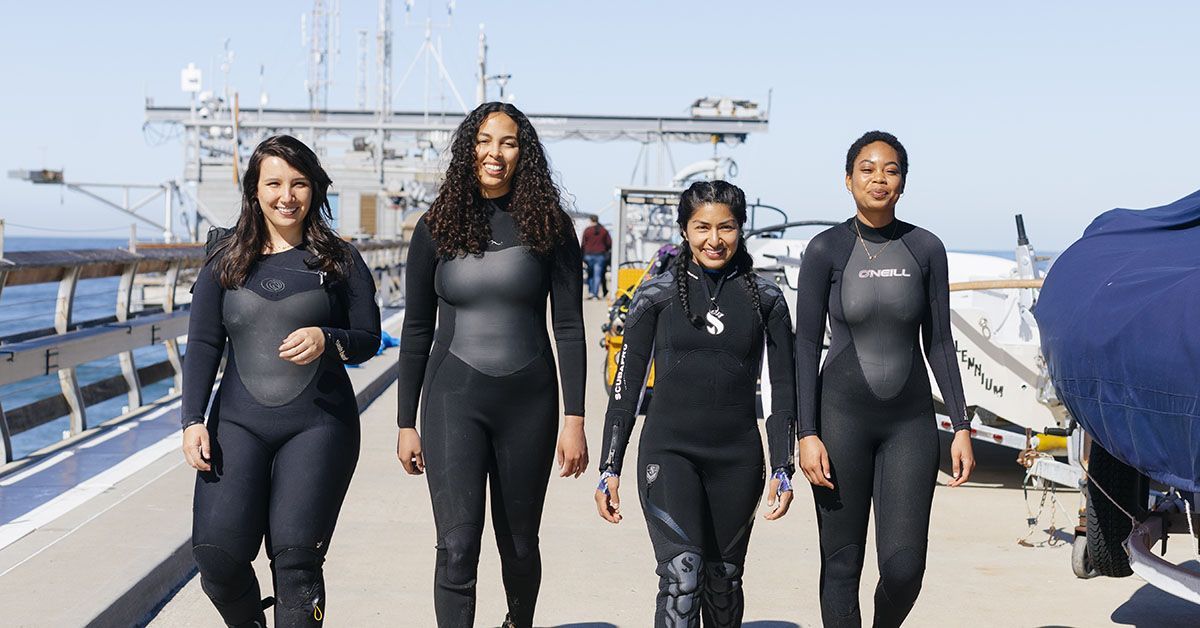Scripps-Led Fellowship Program Promotes Equal Access For Students Interested In Scientific Diving
Fellows of the first SCUBA DIVERsity program cohort share their experiences; Fall 2023 applications open May 30
Story by:
Published Date
Article Content
Since 1954, Scripps Institution of Oceanography has set the standard for diver training at the University of California and has created opportunities for hundreds of scientific divers. The Scripps Scientific Diving program oversees between 150-200 active scientific divers on UC San Diego’s campus, while certifying approximately 32 new scientific divers annually.
However, the path to reach scientific diver certification status often presents cultural, financial, physical and emotional challenges.
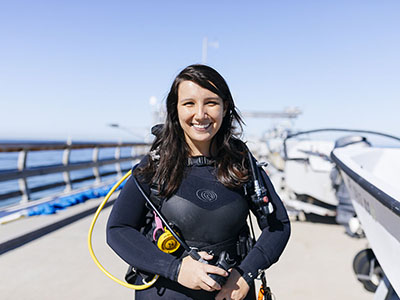
In an effort to make the diving community a more inclusive and diverse space, Scripps PhD candidate Erica Ferrer and then-PhD candidate Alyssa Griffin (now Assistant Professor at UC Davis) launched the SCUBA DIVERsity Fellowship Program at Scripps in the fall of 2022. They have worked alongside Scripps Director of Diversity Initiatives Keiara Auzenne and Scripps Dive Safety Officer Christian McDonald to create this fellowship program that provides undergraduate and graduate students with scientific diver training, access to gear, and even swimming proficiency lessons for those who have limited experience in the water.
Ferrer and Griffin were “blown away” by the amount of students who applied for the DIVERsity Fellowship program last year. This program not only promotes Scripps’ mission to educate and respond to the needs of a diverse and dynamic student body, but also opens doors for future scientists of color and those from underrepresented groups to gain access to research opportunities where diver certification often presents an insurmountable barrier.
“As a mentor, it has been incredible to see the first cohort of fellows become divers and help to build a sense of community within the program,” said Ferrer. “Seeing the fellows excel in the diving community reminds me why we created this program in the first place and why we will continue creating opportunities for future generations of students over the years.”
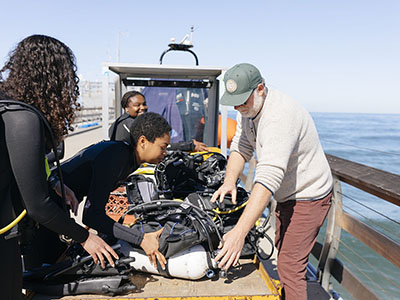
The application period for the Fall 2023 cohort opens May 30 through June 26, 2023. The program is open to undergraduates and graduate students at UC San Diego, with priority given to underrepresented students whose research would benefit from scientific diving certification. Read more about the program on this page and apply here.
The fellowship was made possible thanks to philanthropic contributions from several members of the Scripps Director’s Council and the Scripps Education Department, which have funded the first six years of the program. Dive equipment manufacturer ScubaPro has also offered support by supplying the first cohort with soft gear including wetsuits, masks, fins, and snorkels.
We asked the first cohort of fellows about their experience in the DIVERsity Fellowship program, what they hope to do now with their diver training, and more. Learn more about the fellows below.
Analisa Freitas, MAS Student in Marine Biodiversity and Conservation
What made you decide to apply to the DIVERsity Fellowship Program?
When I decided that going back to school would be my pathway into the marine conservation sector, I had my eye on Scripps and learned about their historic scientific diving course. I was interested in the ways other researchers were using scientific diving as a tool, and I stumbled upon the National Geographic feature of Diving With a Purpose, described as an "international organization that provides education and training programs, mission leadership, and project support services for submerged heritage preservation and conservation projects worldwide with a focus on the African Diaspora." The mix of science and humanities really intrigued me and I was motivated to figure out more ways to do work like theirs. I didn't realize that I'd need initial training first (open water certification), and I was pretty blown away by the cost of that. With the cost of owning my own SCUBA gear, which was recommended by my local dive shop, and required by the scientific diving course, I was stunned. It felt like I had to be in or out; there wasn't really any turning back because the investment was so high. The DIVERsity Fellowship Program, along with other financial support, showed up at the right time to help cover many of these costs. I felt like I could dive confidently and safely with approved and recommended gear. I also hoped that since I knew nothing about diving, with the program I'd be in the company of others who did know about it, and were conscious of respecting the myriad of unique relationships that people can have with the water.
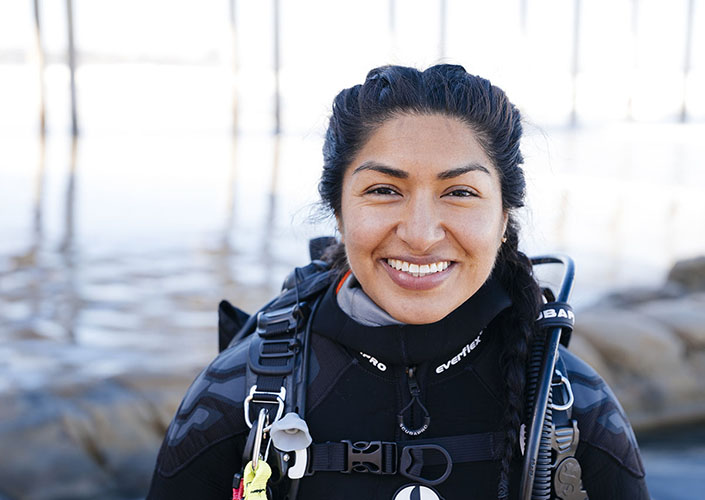
This program aims to make the diving community a more inclusive space. Why is this important to you?
When asked to describe a known marine scientist or a SCUBA diver, I would guess that they think of a white man in goggles holding a beaker, they'll think Jacque Cousteau, maybe. This is in stark contrast to the data point that those of African, Asian, Latin American, and Arab descent around the world make up about 80 percent of people in the world, many of whom are scientists and science divers. I think of the ocean as a connective space between many people and so having a diverse cohort can bring greater understanding. A comment that I hear frequently from people where I grew up in the Central Valley of California, which is inland and away from the coast, is that they very much fear the ocean, not just due to the strength of its water and current but because of the “vicious” animals that they believe reside there. I hope that this type of fear, whether of the ocean or of each other as different people coming from different places, can be dissolved. We can hopefully start building a cadre of divers from our respective identities and in places that perhaps have been overlooked or disinvested in before. I was really happy that my classmates highlighted the program in their film, Behind the Mask, and I was honored to be interviewed for the film alongside some wildly seasoned divers.
What is your favorite part about the program and/or how do you hope to see the program grow?
My favorite part of being in this program is feeling that I have more people to joke with and share my excitement with. I only knew a few people who had dived before the program, and next to none who were science divers, so I really felt blind and a bit alone going into this space. It is nice to have people who are willing to celebrate my victories, when others might consider those events less significant. I hope that more resources across UC San Diego and Scripps Institution of Oceanography are stitched together and more well-crafted for our program participants, such as swim lessons, yoga and meditation classes, mentorship, exposure to how others are using their diving, informal get-togethers for skill checks at the pool and pier, and more. This will hopefully lead to a shared goal that changes diving for the better by making it more inclusive, possible, and still leads to creating strong, safe, skilled, and confident divers for science.
What do you hope to do now with your dive training?
I have so many hopes! I have volunteered with the Bowman Lab on various tasks with their lab manager Caitlyn Webster, as well as with Dani McHaskell, a marine biology PhD student in the Smith Lab. I would love to dive to deeper depths than 60 feet and go through more certifications because I want to feel more confident in any location I might dive in, and become more comfortable with critical skills. Eventually, I plan to return to Central California (the capital, the coast, or the Bay Area) to be close to my mom. For now, I am so ecstatic to share that once I graduate from my MAS MBC program in June 2023, I will be a summer intern with Diving With A Purpose, the National Park Service Submerged Resources Center, and The Slave Wrecks Project at the National Museum of African American History and Culture of the Smithsonian Institution. I will be working at Biscayne National Park in Florida—a park that is over 90% water. This opportunity came by way of the Scripps Center for Marine Archaeology, and I cannot wait to see where this experience leads me next.
What advice would you give to anyone interested in SCUBA diving or becoming a scientific diver?
For me, given the financial investment in this activity, it is important to talk about your return on investment and your expectations. The reality of finding one job with daily science diving as its main responsibility, and that allows you to make a very comfortable living, as well as stay close to your home community, is probably not super common. Find other science divers and talk to them about how they make money doing the work and find the community they need. Be sure to see if not only the purpose of diving appeals to you but also the context in which you will be doing it. I definitely came into SCUBA envisioning only diving in warm water and having incredible visibility, but I had my first open water dives in California at muddy Lake Tulloch and then in chilly Monterey. It was a reality check but I still loved it. I always run on the cold side, but with the help of reusable, medical hot packs (I highly recommend), plus training further at La Jolla, I am much more open to diving in any temperature at any location!
What is one of your most memorable experiences in water?
I definitely remember being pretty scared to descend into the kelp forest in La Jolla during one of my science dives. It was my first time away from Scripps Pier, where I had gotten comfortable, and so I really worked hard to calm my mind and breath as I went down. But when I was at depth, I was completely in awe of the beauty of the kelp and was totally chill. Overcoming personal challenges like that feels like a constant in diving, and it is so worth it. I feel super fortunate to experience a world that many humans do not, and hope to continue doing it in the name of marine conservation.
Ivan Moreno, PHD Student in Marine Biology
What made you decide to apply to the DIVERsity Fellowship Program?
Being a freshwater ecologist, questions about microbial mats found in marine ecosystems and in benthic freshwater lakes have always fascinated me. These mats sometimes tend to be expansive and cover large areas relative to the hot spring microbial mats I currently study. Attaining scientific diver status would allow me to use those skills as a tool to answer those questions.
This program aims to make the diving community a more inclusive space. Why is this important to you?
I was never exposed to what SCUBA diving certification entails or what it can be used for prior to arriving at Scripps, so being a source of guidance to other students like myself, and those at the undergraduate level is important to me. I hope that others with extremely limited SCUBA knowledge can come after me in the DIVERsity program and use the financial resources available to attain certification and explore the natural marine world for both research and personal experience.
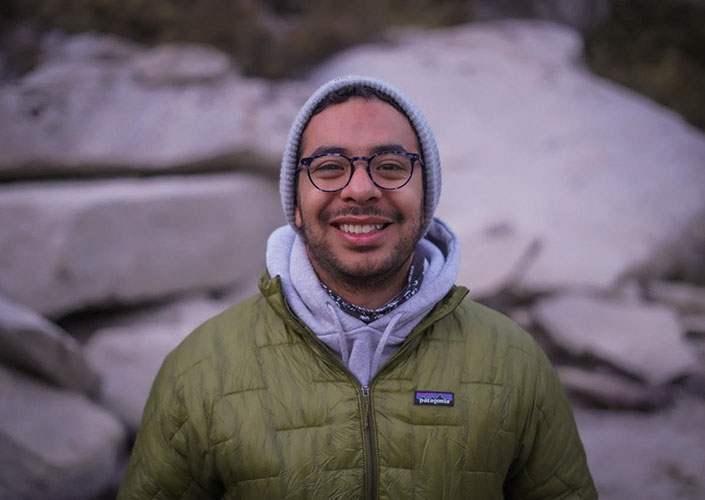
What is your favorite part about the program and/or how do you hope to see the program grow?
It’s amazing to not have to wait for reimbursements on gear and diving courses. This is a huge barrier when you’re a first-generation student and having those expenses taken care of through this fellowship is the only way I’d be able to gain this experience. I hope to see funding increase and continue throughout the next few years and see others like myself get access to a breadth of SCUBA knowledge from other divers here at Scripps.
What do you hope to do now with your dive training?
While I haven’t reached scientific diving status, I hope to first eventually embark on scientific diving trips to assist in data collection and field exploration projects. Getting this experience would be instrumental to using my own certification to conduct research of my own and assist others who are just beginning their SCUBA journeys.
What advice would you give to anyone interested in SCUBA diving or becoming a scientific diver?
I would recommend seeking advice from anyone who you may know is trained in SCUBA diving as soon as you can and look for both mentorship and financial assistant resources.
What is one of your most memorable experiences in water?
I don’t have any SCUBA memories yet, but I look forward to hopefully diving in the kelp forests for the first time in the near future. I’ve heard it’s a great time from all the divers I've spoken with and getting to see an entirely different type of ecosystem with my own eyes sounds like an amazing experience.
Jordan Griffin, PHD Student in Archaeology
What made you decide to apply to the DIVERsity Fellowship Program?
I decided to apply to the DIVERsity Fellowship Program to pursue my career and research, seek a support network, and potentially make an impact on people considering diving and scientific research. Visibility matters.
This program aims to make the diving community a more inclusive space. Why is this important to you?
Inclusivity and equity are required to move any field forward. This program provides direct access to certification that is costly and exclusionary.
What is your favorite part about the program and/or how do you hope to see the program grow?
Having structured support has been essential to my growth and journey to scientific diving certification. I'm so grateful to have connected with my cohort and the mentors surrounding us.
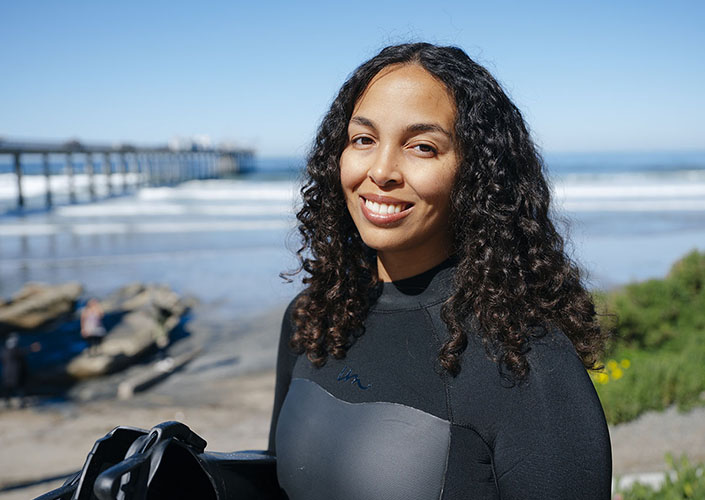
What do you hope to do now with your dive training?
Once I complete my scientific diving training, I will be able to collect data for my dissertation research in Montana and California. I also plan to become trained in underwater archaeology by the organization Diving With a Purpose.
What advice would you give to anyone interested in SCUBA diving or becoming a scientific diver?
Connect with scientific divers locally or on social media! More and more of us are popping up.
What is one of your most memorable experiences in water?
My most memorable experience with water is surfing for the first time. It was a huge milestone for me! I'm really looking forward to diving and memorable experiences underwater.
Toni Sleugh, PHD Student in Marine Biology
What made you decide to apply to the DIVERsity Fellowship Program?
I applied because I was already planning to take the scientific diving course but was intimidated by my relative lack of experience with diving and being in the water in general. I was interested in the support offered to prepare fellows for the course, especially things like paying for a swim proficiency class which I think was key in my success in the class. But mostly, I was excited about building a community of divers of color with all different experience levels and creating a more inclusive and supportive environment for other students who may be feeling the same intimidation as I was feeling.
This program aims to make the diving community a more inclusive space. Why is this important to you?
This is important to me because one of the biggest sources of anxiety for me about the scientific diving course was knowing that not only would I be the only Black woman in the class, but I was also the least experienced. This program made me feel much more comfortable knowing that there were other divers of color who experienced the same feelings and that there was support there for me if/when I needed it. I’m looking forward to being that same support system for future fellows and other students from underrepresented groups.
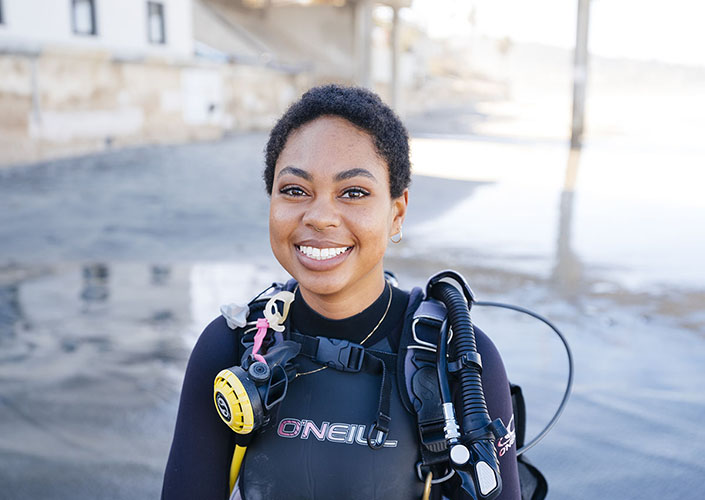
What is your favorite part about the program and/or how do you hope to see the program grow?
I’ve really enjoyed getting to know the other fellows and learning more about the science they do and how they plan to incorporate diving into their research! I’m excited for the program to grow so we can continue to add to our new community.
What do you hope to do now with your dive training?
I’m most looking forward to helping out with the Grouper Moon Project, a long term study of the impacts of science-based management on a historically overfished population of Nassau Grouper in the Cayman Islands. I went in 2022 as surface support but I’m excited to be able to get in the water and count some fish! I’ll also be doing some local diving to help maintain an array of acoustic receivers off the coast of La Jolla used to study the movement ecology of various fishes.
What advice would you give to anyone interested in SCUBA diving or becoming a scientific diver?
There can be a lot of obstacles to starting SCUBA diving, whether it’s the cost of gear and training or just being intimidated by the concept of diving. My advice is to look for resources or people that may be able to help you tackle those obstacles. Getting connected to groups like Black In Marine Science (BIMS) and Black Women in Ecology, Evolution, and Marine Science (BWEEMS) has helped connect me to various sources of support, so finding a similar affinity group would be a great start.
What is one of your most memorable experiences in water?
My all-time favorite dive would have to be the night dive we did during the scientific diving course! It was our last night at the University of Southern California’s Wrigley Marine Science Center on Catalina Island and I had been really nervous because I’d never done a night dive before but it ended up being the coolest experience! We saw lots of critters that aren’t usually as active during the day like lobsters, rays, and a horned shark. We also turned our lights out and got to see some bioluminescence which was so magical!
Share This:
Stay in the Know
Keep up with all the latest from UC San Diego. Subscribe to the newsletter today.
